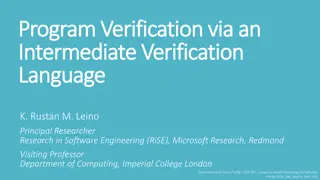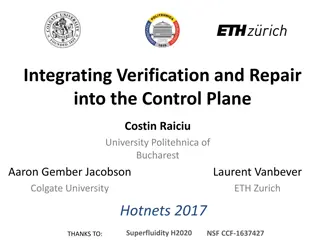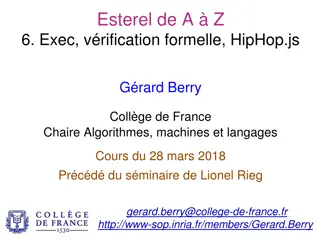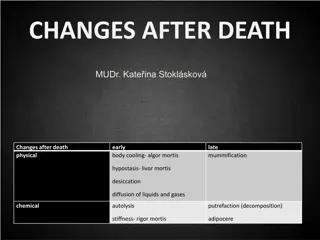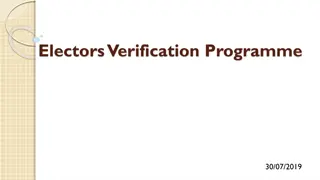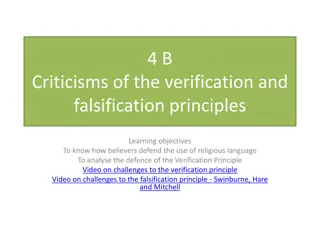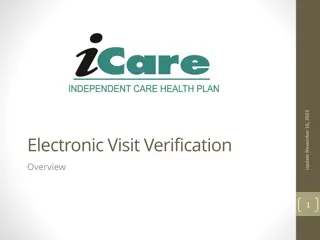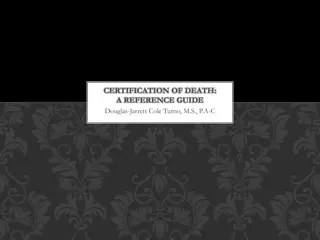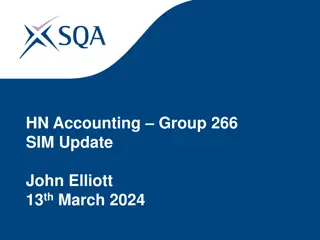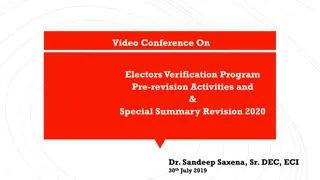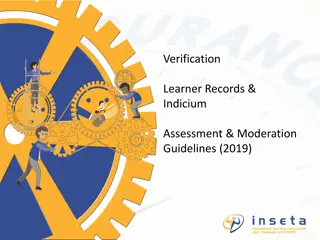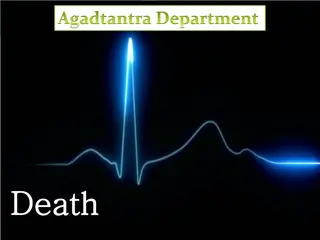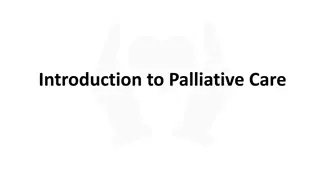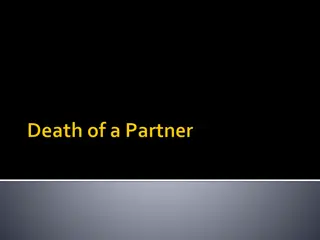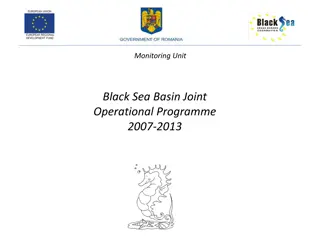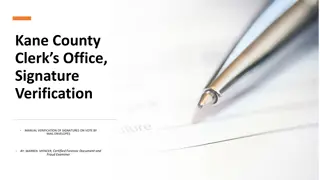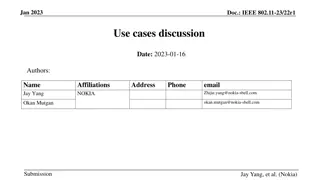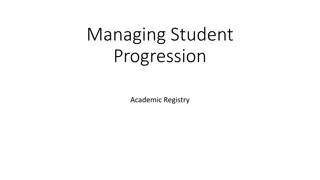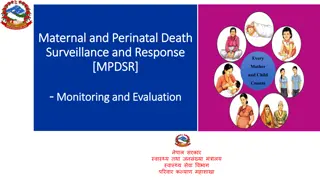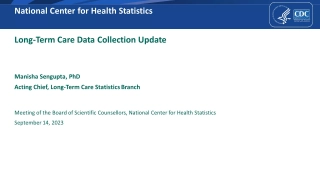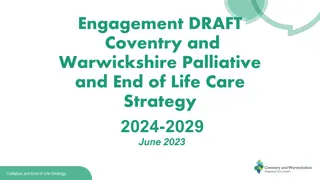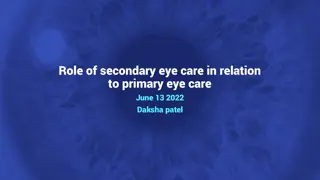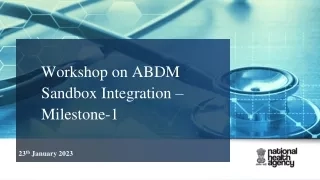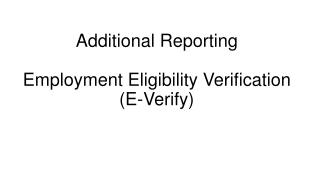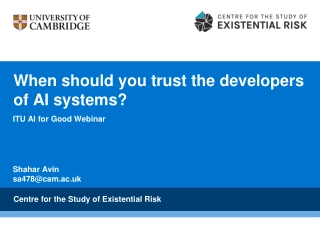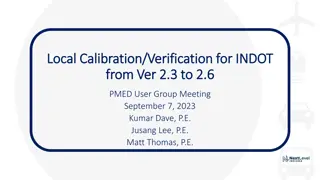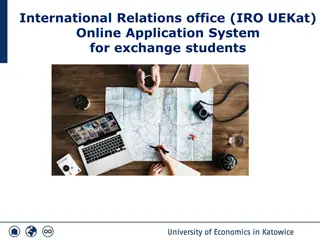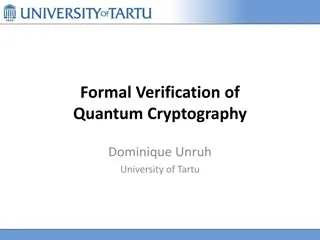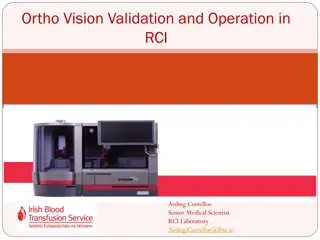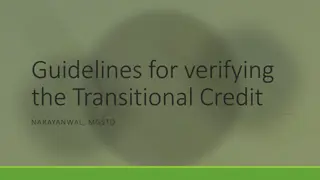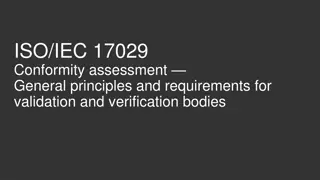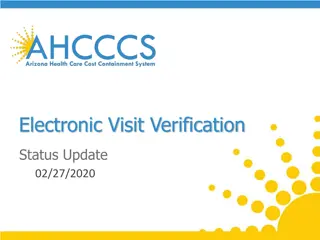Importance of Timely Verification in Care After Death
Understanding the verification process and importance of timely verification in care after death is crucial for improving the experience of death and dying for families. This session covers the definitions, process, and care after death, emphasizing the significance of timely verification in end-of-life care. Verification of death confirms passing, while certification by a doctor establishes the cause of death. The session also delves into expected deaths, verification processes, and considerations for implantable devices. www.thameshospice.org.uk | 01753 842121
Download Presentation

Please find below an Image/Link to download the presentation.
The content on the website is provided AS IS for your information and personal use only. It may not be sold, licensed, or shared on other websites without obtaining consent from the author. Download presentation by click this link. If you encounter any issues during the download, it is possible that the publisher has removed the file from their server.
E N D
Presentation Transcript
Care after Death 21st January 2019 www.thameshospice.org.uk | 01753 842121 | www.thameshospice.org.uk | 01753 842121 | | Charity No.1108298 | Charity No.1108298
2 Aims of the session 1. Importance of timely verification 2. Definitions 3. Process 4. Care after death 5. Notifiable deaths www.thameshospice.org.uk | 01753 842121 | | Charity No.1108298
3 WHY IS TIMELY VERIFICATION IMPORTANT? o Part of the on-going process in EoLC o Improve experience of death & dying for the family o Reduction in delays o Date of death www.thameshospice.org.uk | 01753 842121 | | Charity No.1108298
4 Verification of Death confirms that a person has died DOESN T have to be a doctor Certification of Death establishes the cause of death MUST be a doctor www.thameshospice.org.uk | 01753 842121 | | Charity No.1108298
5 What is an expected death ? a death following on from a period of illness which has been identified as terminal, and where no active intervention to prolong life is ongoing. (Ayris, 2002) www.thameshospice.org.uk | 01753 842121 | | Charity No.1108298
6 VERIFICATION PROCESS (AMRC, 2008) Absence of central pulse for at least 1 minute No heart sounds for at least 1 minute Absence of breath sounds for at least 1 minute CHECKING SHOULD TOTAL FIVE MINUTES Cessation of cerebral function o Pupils fixed & dilated o No reaction to trapezius squeeze Absence of carotid pulse for over one minute www.thameshospice.org.uk | 01753 842121 | | Charity No.1108298 Absence of heart
7 Spontaneous respiratory or cardiac activity ? (AMRC, 2008) Repeat the process for 5 minutes Check fixed dilated pupils Check corneal reflex Check response to supra-orbital pressure No response to painful stimuli www.thameshospice.org.uk | 01753 842121 | | Charity No.1108298
8 IMPLANTABLE DEVICES ICD defibrillators, CRTDs Pacemaker Radioactive implants Intrathecal pumps and neurostimulators Fixion nails www.thameshospice.org.uk | 01753 842121 | | Charity No.1108298
9 DEATHS REPORTED TO A CORONER Recent change in guidance: The deceased needs to be seen either 14 days prior or after death There is now a legal duty to notify the coroner The medical examiner system safeguards for the public - scrutiny of non-coronial deaths appropriate direction of deaths to the coroner better service for the bereaved - opportunity to raise concerns to a doctor not involved in the care of the deceased improve the quality of death certification improve the quality of mortality data www.thameshospice.org.uk | 01753 842121 | | Charity No.1108298
10 WHEN TO REPORT TO A CORONER poisoning, or exposure to / contact with a toxic substance; the use of a medicinal product, controlled drug or psychoactive substance; Violence, trauma or injury; self-harm or neglect, including self-neglect; the person undergoing a treatment or procedure of a medical or similar nature an injury or disease attributable to any employment held by the person during the person s lifetime; any other unnatural death the cause of death is unknown; the person died while in custody there is no attending medical practitioner the attending medical practitioner is not available within a reasonable time to sign the certificate of cause of death; the registered medical practitioner is unable to establish the identity of the deceased person www.thameshospice.org.uk | 01753 842121 | | Charity No.1108298
11 SUSPICIOUS DEATH? E.g. Complaint about care Circumstances surrounding the death Leave all I.V. cannulae & lines in situ Clamp I.V. infusions & syringe drivers Catheter & contents Do not wash the body or do any mouth care www.thameshospice.org.uk | 01753 842121 | | Charity No.1108298
12 DEATHS REQUIRING POLICE ATTENDACNE There situations are usually dealt with by paramedics. If you are called to one of these situations, consider police attendance: Suspicious Deaths and where criminality may be a factor. violent and unnatural deaths due to accident or trauma. Fatal accidents of all types (e.g. Road Traffic Incidents, works accidents, factory accidents etc.). Suicide. Death due to suspected drug abuse. deaths where alcohol is a contributory factor (e.g. where a person sustained a head injury whilst intoxicated). Persons found dead after forced entry into premises. Even if the death appears to be from natural causes. Person died in a public place. Any death in hospital / care home where there may be criminal neglect or malpractice. Deaths in private premises where the next of kin, family member, or other responsible adult will not take responsibility for the deceased likely to occur where the ambulance service have attended but the person on scene is not willing to remain and police presence is required to ensure arrangements are made for the body to be removed Where body is found and the decomposition process has started. Deaths where the person is not registered with a (local) GP. www.thameshospice.org.uk | 01753 842121 | | Charity No.1108298
13 MESOTHELIOMA (TH POLICY) o Deaths from mesothelioma are considered notifiable & coroner needs to be informed o The doctor has overall responsibility for ensuring process is followed o A doctor or RN can verify the death o Dr. informs the local coroner via the online form found at http://www.reading.gov.uk/coroners o The police are no longer required to attend or be informed of an expected mesothelioma death oThe person can be transferred to the family s appointed FD o Family coroner involvement & possible autopsy www.thameshospice.org.uk | 01753 842121 | | Charity No.1108298
CARE AFTER DEATH https://www.gov.uk/after-a-death Your guide to Bereavement (WAM Registration Service) What needs to be done after a loved one dies Sue Ryder www.thameshospice.org.uk | 01753 842121 | | Charity No.1108298
15 RESOURCES Care After Death. Guidance for staff responsible for care after death. hospiceUK (2015) Guidance for staff responsible for care after death. Developed by the National End of Life Care Programme & National Nurse Consultant Group (Palliative Care) (2011) Code of Conduct. NMC (2015) A Code of Practice for the Diagnosis and Confirmation of Death (2008). Academy of Medical Royal Colleges. British Medical Association (2015) Confirmation and certification of death. Available at: http://bma.org.uk/practical-support-at-work/gp-practices/service- provision/confirmation-and-certification-of-death Local policies www.thameshospice.org.uk | 01753 842121 | | Charity No.1108298


